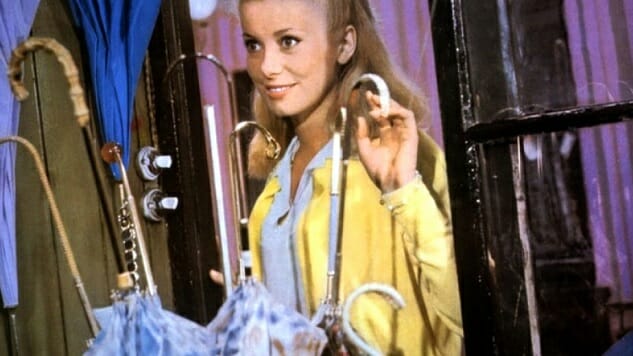Best of Criterion’s New Releases, April 2017

Each month, the Paste staff brings you a look at the best new selections from The Criterion Collection. Much beloved by casual fans and cinephiles alike, The Criterion Collection has for over three decades presented special editions of important classic and contemporary films. You can explore the complete collection here. In the meantime, here are our top picks for the month of April:
 Woman of the Year
Woman of the Year
Director: George Stevens
Year: 1942
For a movie made 75 years ago, Woman of the Year feels surprisingly contemporary and amusingly familiar; men are from Mars, where they write sports columns, and women are from Venus, where they chronicle global politics. Pit them against each other on the page, and they’re bound to stumble head over heels in love-hate when they meet for the first time in real life. The only obstacle to their amour is success—her success, to be exact, because even in 2017 men are poorly equipped to deal with the realization that their better half can wheel, deal and bring home the proverbial bacon as surely as they can. Back in 1942, you can imagine Katherine Hepburn out-achieving Spencer Tracy being ten times as harsh a blow to his ego than it would be today, and there you have it, the tension driving George Stevens’ romantic comedy classic in a nutshell.
What’s especially great about Woman of the Year is captured perfectly by Time’s eminent film critic, Stephanie Zacharek, in the essay she composed for the film’s Blu-ray disc: If you’ve ever wondered what it’s like to watch two people fall in love, then all you need is to spend two hours with Hepburn and Tracy, who grew smitten with each other off-camera while playing characters who grow smitten with each other on-camera. This is 1940s comic brio at its finest, replete with rapid fire banter, and 1940s romance at its finest, layered with affection, annealed by passion and the clash of gender norms. It’s a gem. —Andy Crump
 The Umbrellas of Cherbourg
The Umbrellas of Cherbourg
Director: Jacques Demy
Year: 1964
How funny that Criterion would release a Blu-ray edition of The Umbrellas of Cherbourg only a couple of months after La La Land trod upon the 89th Academy Awards and cast its derivative shadow over the entire evening. (Not to ignore the dual-release of The Young Girls of Rochefort or anything, but let’s all agree that Umbrellas is the bigger deal by far.) Demy’s masterpiece is the film that Chazelle’s very clearly wants to be, after all, a soaring, vibrant, innately bittersweet story of love lost, found, and forever disbanded, another wartime casualty in a country scarred by military conflict. That’s what separates the influenced from its influences, though: authenticity. The Umbrellas of Cherbourg is lived-in, a story derived from Demy’s own life experiences, and that keyword—experience—is critical to what makes the film click. Take away its musical tones, and you’re left with a narrative about a young man and a young woman, both crazy about each other, who are torn apart when he’s drafted to fight overseas. It still functions as cinema. The music, of course, is an essential part of its character, a dose of magic Demy infuses with the rigors of reality that supply the film with plot and meaning.
To watch The Umbrellas of Cherbourg is to enjoy the inverse effect of Woman of the Year: It’s about people in love falling out of love, and then falling in love all over again with new partners and altered hearts. It’s a beautiful picture as likely to make you swoon as to crush your heart. —Andy Crump
 Tampopo
Tampopo
Director: Juzo Itami
Year: 1985
Juzo Itami’s sensual, spiritual and all-around humorous 1985 film Tampopo has long since taken its rightful seat at the table with cinema’s great “food” movies. Like Babette’s Feast and Big Night, Itami’s film explores the consummate role of food—and of the cooking experience—in knitting together the human condition. In terms of story, Tampopo centers on the efforts of its title character (Nobuko Miyamoto) to become a top-notch ramen chef. Surrounding the main storyline are myriad vignettes, mostly unconnected in character and setting, depicting the many ways (sometimes subtle but usually not) the consumption of food is inescapably intertwined with all aspects of our lives. Not every vignette hits the mark, and to modern audiences, some will be more likely to trigger a raised eyebrow, or perhaps an “okay”—I couldn’t help but think of Monty Python’s The Meaning of Life in that regard. But as a whole, Itami’s film remains a uniquely joyous affair.
-

-

-

-

-

-

-

-

-

-

-

-

-

-

-

-

-

-

-

-

-

-

-

-

-

-

-

-

-

-

-

-

-

-

-

-

-

-

-

-

 Rumble Fish
Rumble Fish






































